November 18th Transform Westside Summit: Highlighting the Historic Westside Gardens with Rosario Hernandez
Westside Future Fund’s November 18th Transform Westside Summit highlighted the Historic Westside Gardens, a nonprofit helping to offer fresh affordable, and often free, produce to over 300 Westside households in one of Atlanta’s food deserts. John Ahmann, WFF’s President & CEO, opened the program alongside co-hosts Ebony Ford and Benjamin Earley, who’d go on to moderate the featured panel discussion. Special guests included key Historic Westside Gardens personnel: Rosario Hernandez, Executive Director; and team members Rochelle Barnett, Chapelle Benton, Kimble Joyner, and Alvin Mirandez.
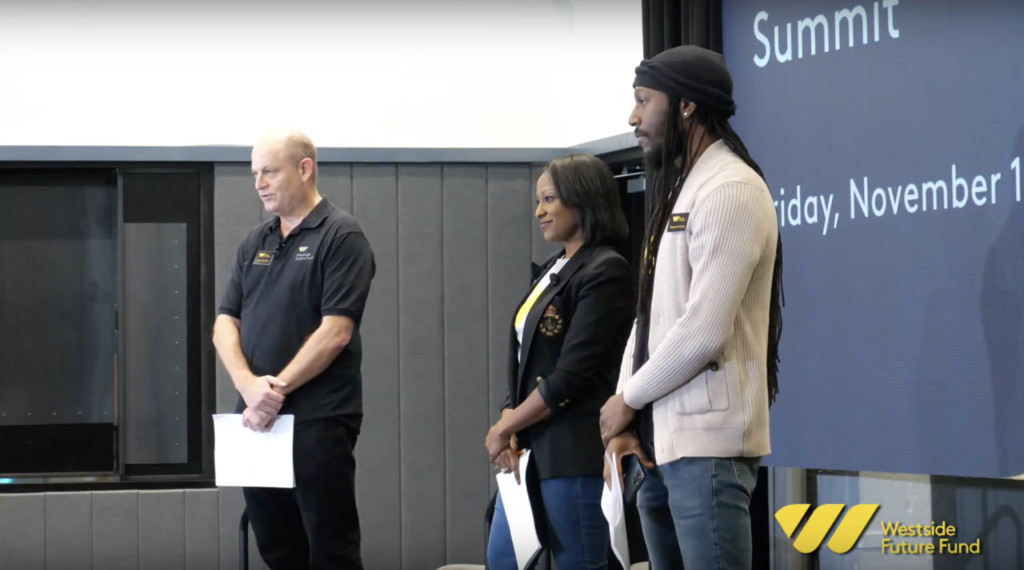
(From left) John Ahmann, Ebony Ford and Benjamin Earley welcome summit attendees.
I’m so grateful to serve in the community that I live.”
—Rosario Hernandez, Executive Director, Historic Westside Gardens
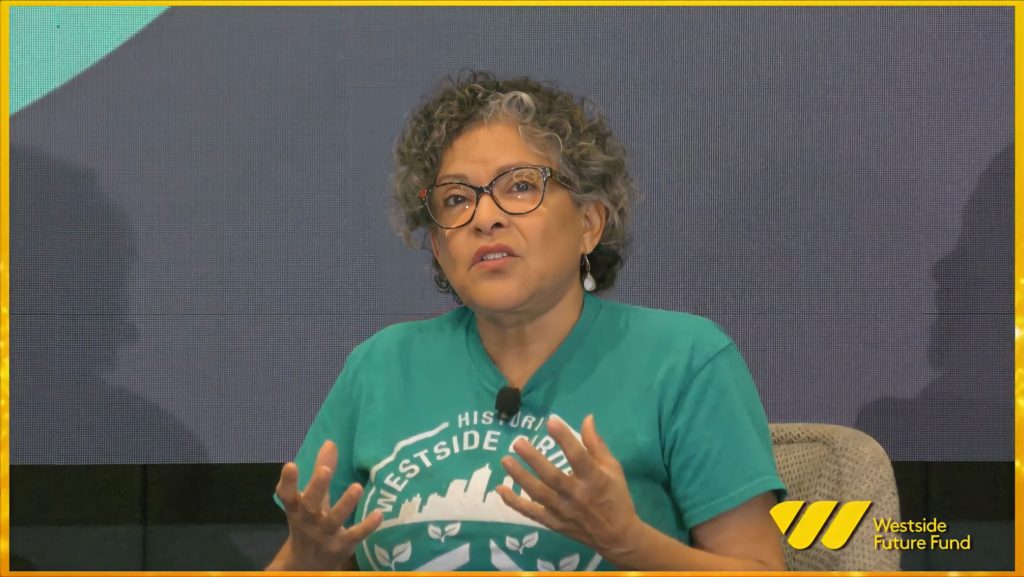
Rosario Hernandez, a former teacher of 20 years, now uses her skills to teach Westside residents how to grow fresh food.
HWG has helped install over 80 residential gardens, 4 community gardens and a children’s garden in Metro Atlanta.
Hernandez: “The Teacher in me said anybody could learn. If I learned, taught myself, I could teach other folks how to do this. We hit the streets, knocking on doors… ‘would you like a garden?’”
Hernandez: “Oasis at Scholars Landing, they have a beautiful garden in the backyard. We pull produce from there and do cooking demos, and the residents come down. The most important thing about the residentials is those seniors—folks with limited mobility—that’s their whole community in that apartment complex. When we come in, they get to engage. They talk, they explain how they used to farm, how they used to take care of crops. We bring something more than food. We bring an engagement piece.”
Benton: “I know it’s for the people. It’s so much bigger than what it seems. It is really more spiritual than the norm. It gives me a sense of purpose. It helps me. Believe me, these seeds and growing seeds, it helps with integrity, morals, patience, kindness and love.”
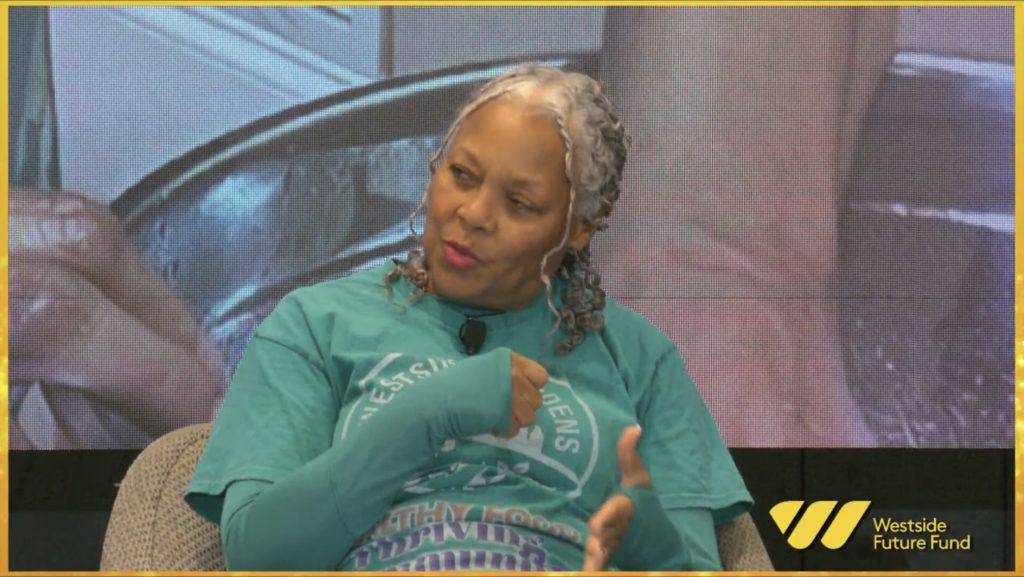
Rochelle Barnett, HWG team member.
Earley: “Many people take for granted, there are a number of people who quite frankly just can’t afford to eat very healthy or they live in an area that is deprived of healthy options. So, to actually be able to invest in your health through food is great because it saves you that money later on when it comes to health care. But what types of foods do you grow, what types of crops?”
Barnett: “This is the season, fall and winter mostly for any greens. So, any green you can think of—collard greens, kale, cabbage, broccoli, cauliflower, all of that. But then there’s root vegetables and the carrots and onions and garlic.”
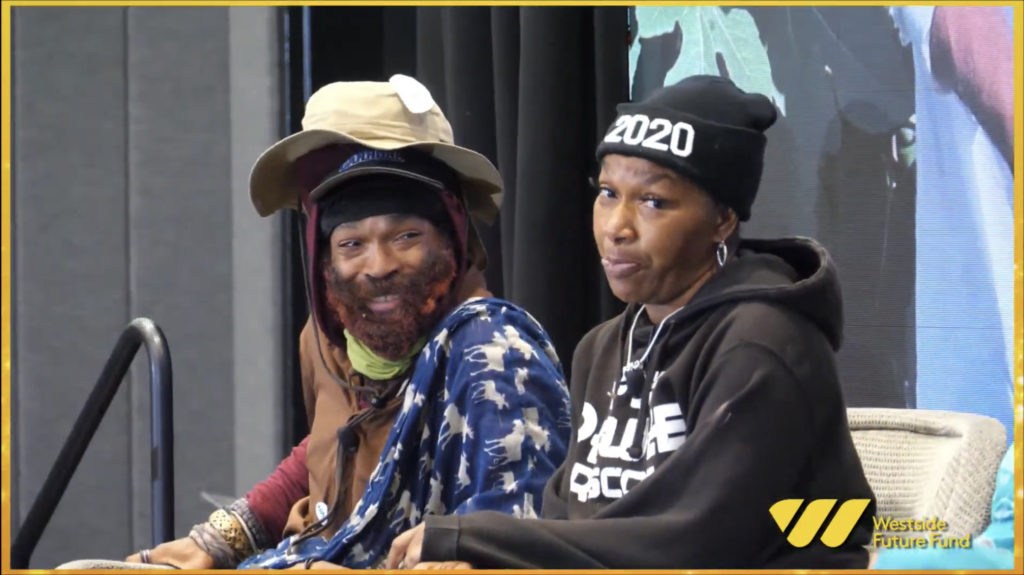
Kimble Joyner (left) and Chapelle Benton, HWG team members.
Benton: “We grew lettuce in the garden this year. And, when I went in the grocery store, I saw the same lettuce, and the price of the lettuce. It had a nice Springfield lettuce and I looked, ‘oh my god, seven dollars!’ So, when I went to go work at the farms I told Miss Rosario, can I please have some lettuce?”
As many residents continue to feel the impacts of inflation in the grocery stores, HWG offers fresh and often free produce.
Hernandez: “You do save money. Your food budget does go down and you find yourself not buying that… It makes it so easy, especially the herbs, just enhances the food. What we don’t realize is that herbs have so many nutritional properties. It’s so good to cook with them… It starts to become a way of life for us.”
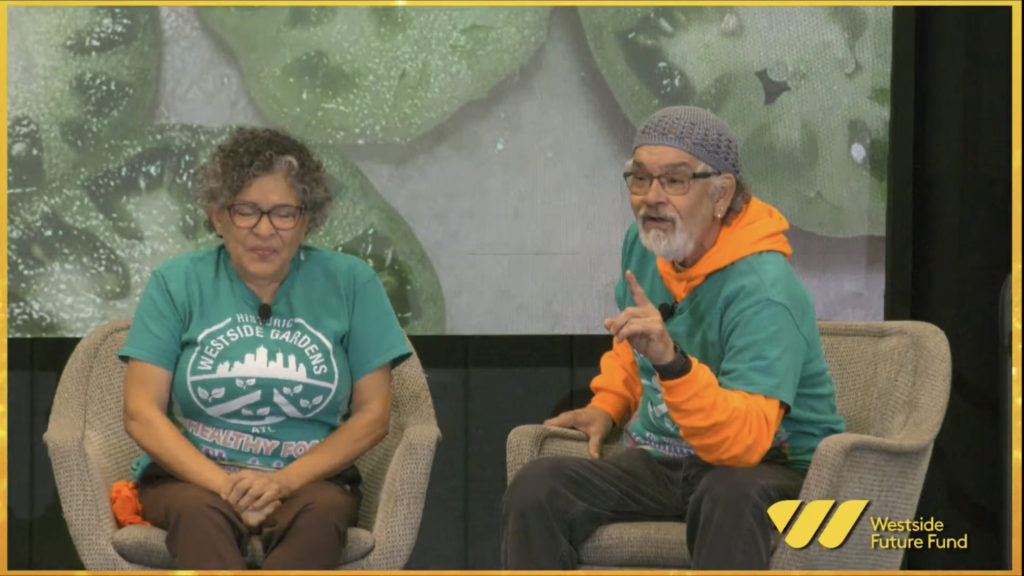
Hernandez (left) and Alvin Mirandez recount having to build 16 garden beds within 48 hours.
Mirandez: “This young lady told me, ‘I need 16 beds and I need them done in two days.’ I did it in one. Once you start working with your hands, and you’re creating and developing something that you can actually see and say, ‘I’m so proud I built that,’ that’s what we have to do with communication. Every human being must communicate because if we don’t everything just falls apart. I appreciate Miss Rosario and the team. She’s a demanding person. She does it because we got a community that we have to serve. Time doesn’t wait for nobody.”
Earley: “What type of community programs do you offer at the gardens?…What are the types of programs do you have?”
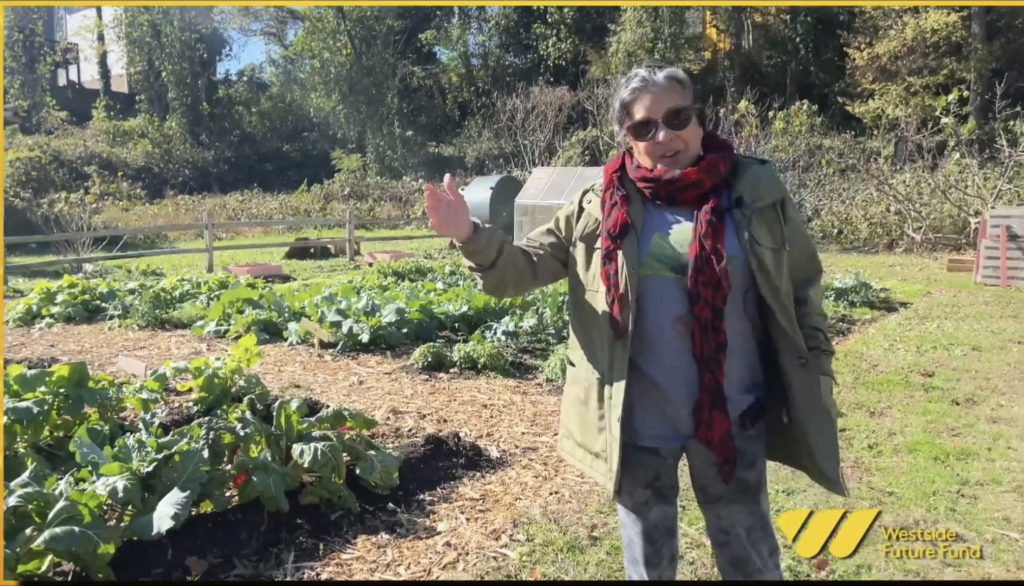
Rosario Hernandez at HWG’s Elm Street Farm.
“The Elm Street Farm is a small farm that we just started to revitalize in March, and it’s come a long way since we started,” said Hernandez, who then highlighted an event that would happen the following day where residents could have their soil tested for contaminants, get their blood pressure checked, and learn more about urban gardening. The event was in partnership with Emory University and Morehouse School of Medicine. Residents also learned about how the Westside Growers Market increases access to fresh produce throughout the community. “We accept EBT,” said Hernandez. “We call it eat better today.” She went on to acknowledge supporters of her organization including Foodwell Alliance.
Hernandez: “Foodwell Alliance has always been a good supporter of what we do from the beginning. Last Saturday we planted six fruit trees and four blueberry bushes and… we built the accessible garden beds, at a property that actually is owned by Westside Future Fund. We call it Heaven’s Corner. It’s on English Avenue. We have three accessible beds, where if you’re a senior and you can’t do all this bending down… those beds are there for that purpose. Foodwell Alliance helped to pay for that wood because we use cedar and it was very expensive. In addition, the fruit trees, the garden grants that we get every year and just to have that collaboration. They come out with volunteers… Foodwell Alliance has always been there for us and we appreciate it. Absolutely.”
Earley: “What would you say are some of the biggest challenges, besides owning properties, that you know Historic Westside Gardens has?”
Hernandez: “Funding. Operational money. I don’t expect these folks to work for you know, minimum wage. They need to be paid what is considered a livable wage, which to me for the amount of work that’s being done should be more because this is hard.”
“We need a lot of technical support. When I was being raised we didn’t have a lot of computers. We did bookkeeping with a ledger—the Dewey Decimal. But you know there are other things—flyers, promotion. Bring those kids out to the garden so they can learn. There’s other things you can do and you don’t have to leave your house to do. Just spread the word.”
Hernandez encouraged people to volunteer, bring their families and take advantage of the gardening services available.
View the full summit including the audience Q&A below!
